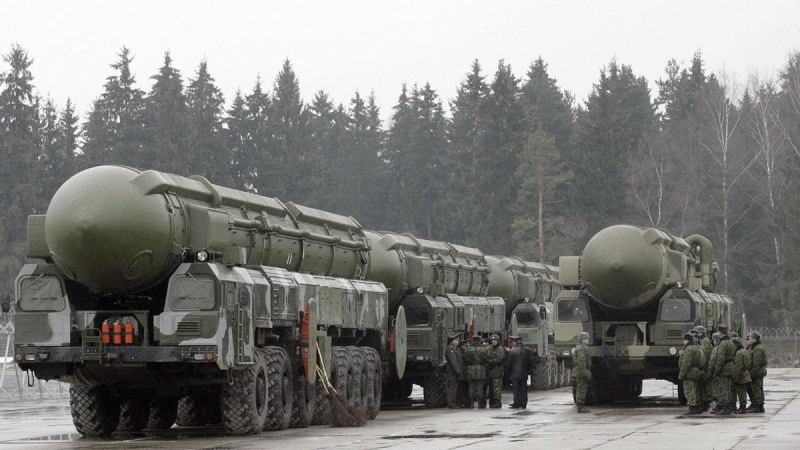
Russia has the largest stock of nuclear warheads
The world is on the verge of a new arms race. But this time we are talking about nuclear weapons, the number of which will begin to grow in the world.
Since the end of the Cold War, the world has experienced a reduction in its nuclear arsenal. However, this process ends in 2022. And now the world expects an increase in the number of nuclear weapons. And with it, the risk of using nuclear weapons has grown – it now seems higher now than at any time since the height of the Cold War. Such data are provided by analysts from the Stockholm Peace Research Institute (SIRPI).
Reduction, but not disarmament
Only nine countries possess nuclear weapons in the world – the USA, Russia, China, France, Great Britain, Pakistan, India, Israel and North Korea. At the same time, Israel does not confirm its data on the presence of nuclear weapons, but does not refute it either. And 90% of all stocks of nuclear weapons fall on two countries – Russia and the United States.
Important! Ukraine was also a country with nuclear weapons. But in 1994 relinquished its nuclear arsenalin exchange for security guarantees – inviolability of borders and sovereignty. So the Budapest Memorandum was signed, where the United States, Great Britain and Russia acted as security guarantors. But Russia violated the terms of this memorandum in 2014 when it occupied Crimea and part of Donbass. With the exception of a few sanctions, the aggressor did not suffer any punishment for this.
As of January 2022, analysts counted 12,705 nuclear warheads, of which 9,440 are active and potentially ready for military use. The rest refer to stored or standby warheads that require some preparation (such as transportation and loading onto launchers) before they can be deployed
Experts estimate that 3,732 warheads were deployed along with missiles and aircraft, and about 2,000 – almost all Russian or US – were kept on high alert.
Number of nuclear warheads by country as of January 2022
- Russia – 5977< /li>
- USA – 5428
- China – 350
- France – 290
- UK – 225
- Pakistan – 165< /li>
- India – 160
- Israel – 90
- North Korea – 20
In January 2021, the total number of nuclear warheads was slightly higher – 13080. However such a reduction is not related to disarmament, but only to the decommissioning of obsolete systems in Russia and the United States, which was planned several years ago. The number of warheads in the usable military stocks of the two countries remained relatively stable in 2021.
“There are clear signs that the cuts that have characterized global nuclear arsenals since the end of the Cold War are over,” said Hans Christensen, Senior Scientist at the SIPRI Weapons of Mass Destruction Program
Nuclear Weapons Modernization
Now in the world, states with nuclear weapons are either developing or deploying new weapons systems, or have announced their intention to do so.
China is in the middle of a major expansion of its nuclear weapons arsenal – satellite images indicate the construction of more than 300 new missile silos. Also, several nuclear warheads will be put on the new submarine.
In 2010, the UK government stated that it had no plans to increase the number of nuclear warheads in service. There were 225 of them then. But already in 2021, official London changed its policy of gradual disarmament, which lasted for a decade, announcing an increase in its stocks to 260. This happened against the backdrop of criticism towards China and Russia for the lack of nuclear transparency. The UK also announced that it will no longer publicly disclose the country's operational stockpile of nuclear weapons, warheads or deployed missiles.
In early 2021, France officially launched a third-generation nuclear ballistic missile submarine program.< /p>
India and Pakistan appear to be expanding their nuclear arsenals and both countries have introduced and continued to develop new types of nuclear delivery system in 2021.
It is believed that Israel, which does not publicly recognize the possession of nuclear weapons, is modernizing its nuclear arsenal.
North Korea, while not conducting any nuclear explosions or long-range ballistic missile tests in 2021, continues to prioritize its military nuclear program as the centerpiece of its national security strategy. Analysts estimate that there are currently about 20 warheads in the country. And there is an opportunity to increase them to 45 – 55 warheads.
“All states with nuclear weapons are building up or modernizing their arsenals, and most of them are sharpening nuclear rhetoric and the role of nuclear weapons in their military strategies,” – noted the director of the SIPRI weapons of mass destruction program, Wilfred Wang. He called it a worrying trend.
High probability of using nuclear weapons
It should be noted that all five permanent members of the UN Security Council – China, France, Russia, Great Britain and the United States – possess nuclear weapons. And they worked on a general statement about the dangers of using nuclear weapons. It was published on January 3, 2022. And this statement claims that “a nuclear war cannot be won and can never be waged”
Nevertheless, all permanent members of the UN Security Council continue to expand or modernize their nuclear arsenals and seem to increase the importance of nuclear weapons in their military strategies. Russia even openly threatened the possible use of nuclear weapons in the context of the war in Ukraine. Bilateral negotiations on strategic stability between Russia and the United States have stalled because of the war, and none of the other nuclear states are negotiating arms control .
“While there have been some significant advances in nuclear arms control and nuclear disarmament over the past year, the risk of using nuclear weapons seems higher now than at any time since the height of the Cold War,” – summed up SIPRI Director Dan Smith.

